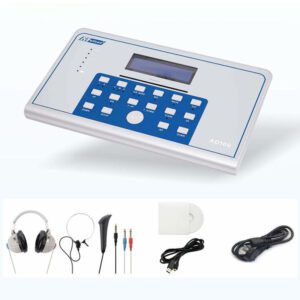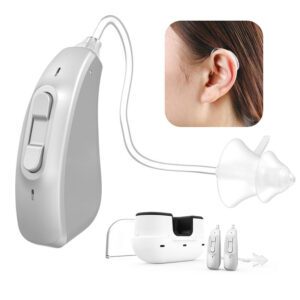The Overlooked Danger – hearing Loss
As people age, maintaining physical health and preventing accidents becomes increasingly important. Among the many health concerns that accompany aging, hearing loss is often overlooked.
Yet it poses a significant risk, especially in increasing the likelihood of falls among elderly individuals. Understanding this connection is crucial for ensuring the well-being and safety of our aging population.
The Link Between Hearing Loss and Balance
The inner ear is responsible not only for hearing but also plays a vital role in maintaining balance. The vestibular system, located within the inner ear, helps regulate our sense of equilibrium.
Hearing loss can disrupt this delicate balance system, leading to increased instability and a higher risk of falls. Research indicates that individuals with mild hearing loss are nearly three times more likely to fall than those with normal hearing.
The Role of Environmental Awareness
Hearing is essential for maintaining environmental awareness. Sounds such as footsteps, traffic noise, and alarms provide critical cues that help individuals navigate their surroundings safely.
For the elderly, diminished hearing reduces their ability to detect these auditory signals, thereby increasing the risk of accidents.
For instance, an elderly person might not hear an approaching vehicle or a shouted warning, leading to dangerous situations that could result in a fall.
Cognitive Impact and Social Isolation
Hearing loss can lead to social isolation, which in turn affects mental health and cognitive function. Social interaction is essential for maintaining cognitive abilities, and when individuals with hearing impairment withdraw from conversations and social gatherings, they may experience cognitive decline.
This decline can impact coordination and spatial awareness, further increasing the risk of falls. Studies have shown a correlation between hearing loss and reduced cognitive function, emphasizing the need for prompt intervention.
Delayed Reaction Times: A Safety Hazard
Elderly individuals with hearing loss often have delayed reaction times to auditory cues. In situations requiring quick responses, such as avoiding an obstacle or reacting to a warning signal, this delay can be critical.
Slower reaction times increase the likelihood of tripping, stumbling, or failing to avoid hazards, all of which contribute to a greater risk of falling.
Prevention and Early Intervention
Given the clear connection between hearing loss and falls, it is imperative to address hearing issues promptly. Regular hearing assessments for the elderly can help detect hearing loss early, allowing for timely interventions.
hearing Aids and other assistive devices can significantly improve auditory perception, enhancing environmental awareness and reducing the risk of falls. Additionally, incorporating balance training and physical therapy can help mitigate the impact of hearing loss on stability.
A Message from Spieth: Protecting What Matters
At Spieth, we understand the importance of hearing every moment, whether it’s the laughter of loved ones, the melodies of your favorite music, or the simple joys of nature.
Our cutting-edge hearing Aids are designed to bring clarity and richness back to your world.
Don’t ignore hearing loss—address it promptly to ensure a safer, healthier future for our elderly loved ones.
For more information, please contact us at medical12@spiethgroup.com.



